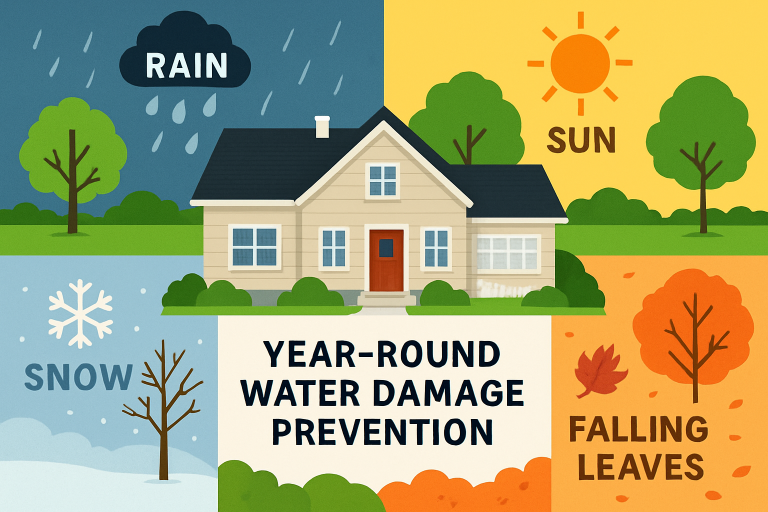Introduction
Water damage is one of the most common and costly problems homeowners face. The consequences can be extensive and expensive to fix, from burst pipes to foundation leaks. Regular maintenance and seasonal readiness are crucial for safeguarding your property and reducing the risk of costly repairs. Fortunately, you don’t have to wait until a disaster strikes. By taking preventive action now—and knowing where to turn for professional water damage restoration if necessary—you can shield your home every season.
Proactive steps such as cleaning gutters, monitoring humidity, and inspecting appliances protect your structure, preserve valuable belongings, and support a healthy living environment. These straightforward strategies can help protect your investment while ensuring peace of mind year-round.
Spring: Prepare for Rain and Thaw
When winter’s snow melts and seasonal rains begin, your home may be vulnerable to leaks and flooding. The thawing process can reveal damage and create new opportunities for water to infiltrate. To prepare:
- Inspect Your Roof: Examine for missing, broken, or curling shingles. Addressing roof damage immediately helps prevent water from entering the structure and causing mold or rot. For tips on roof inspection and maintenance, consider this practical guide from Family Handyman.
- Clean Gutters and Downspouts: Ensure they’re free of leaves and debris, which can block proper water flow and cause overflow, increasing the risk of leaks near the foundation.
- Seal Foundation Cracks: Even small cracks can let in water, especially after heavy rainfall. Use a suitable sealant to prevent costly flooding and structural issues.
Summer: Manage Humidity and Storms
Summer usually brings higher humidity and the threat of severe storms. Improper moisture management can lead to water issues, particularly in basements and attics.
- Maintain Your HVAC: Schedule an annual air conditioner check. Ensuring that drain lines are clear and condensate pans are clean helps avoid moisture collecting indoors, a main trigger for mold growth.
- Install a Sump Pump: In areas with frequent heavy rains, a sump pump is an effective line of defense against basement flooding. Test and maintain the sump pump regularly.
- Monitor Indoor Humidity: Keep humidity levels between 40% and 50%. Use dehumidifiers if needed, particularly in basements, bathrooms, and kitchens, to control moisture and inhibit mold.
Fall: Prepare for Freezing Temperatures
Fall is the time to prepare your plumbing and exterior before the first freeze. This transitional season is critical for protecting pipes and preventing cold-weather leaks.
- Disconnect Outdoor Hoses: Water left in outdoor hoses or faucets can freeze, expanding and bursting pipes. Always disconnect and drain hoses before the temperature drops.
- Insulate Pipes: Add insulation to exposed pipes in basements, crawlspaces, and attics. This simple measure can prevent frozen pipes and minimize repair costs.
- Seal Windows and Doors: Check for and fill gaps using weather stripping or caulk, stopping drafts and condensation from causing hidden water damage.
Winter: Prevent Frozen Pipes
With winter’s freezing temperatures comes the risk of pipes freezing and bursting, leading to significant damage and costly repairs. To reduce your risk:
- Keep the Heat On: Even when away, maintain your home’s temperature above 55 degrees Fahrenheit. Sudden temperature drops can freeze standing water in pipes.
- Drip Faucets: Letting faucets drip slowly keeps water moving and prevents pressure build-up in pipes most at risk of freezing, such as those in exterior walls.
- Open Cabinet Doors: In kitchens and bathrooms, open cabinet doors to circulate warm air around pipes beneath sinks.
Year-Round Maintenance Tips
Ongoing vigilance, regardless of the season, is your best defense against water problems in your home:
- Inspect Appliances Regularly: Review hoses and water connections for washing machines, dishwashers, refrigerators, and water heaters. Look for leaks, bulges, or cracks and replace any worn components immediately.
- Install Water Leak Detectors: Modern sensors can alert you instantly to leaks, allowing you to take rapid action before minor drips become major floods. Learn more about effective leak detection options at Consumer Reports.
- Monitor Your Water Bill: A sudden increase could indicate a hidden leak. Act promptly on unexplained spikes to prevent waste and water-related damage.
Remaining proactive and attentive throughout the year is the key to avoiding water damage surprises. These actions not only protect your investment and property value but can also prevent health issues related to mold and mildew. Make a habit of seasonal checks and quick fixes—the best way to ensure your home stays safe and dry for years.







